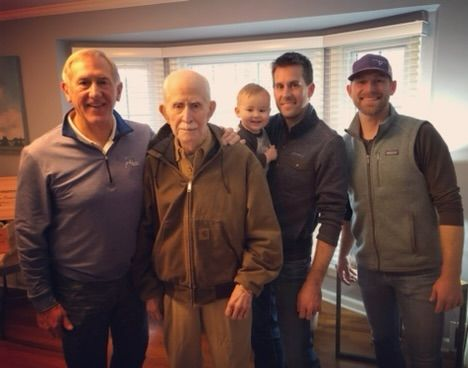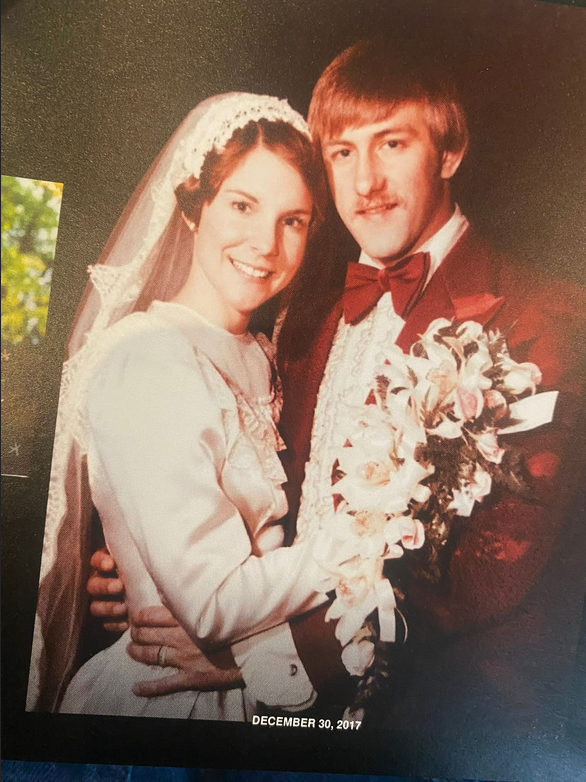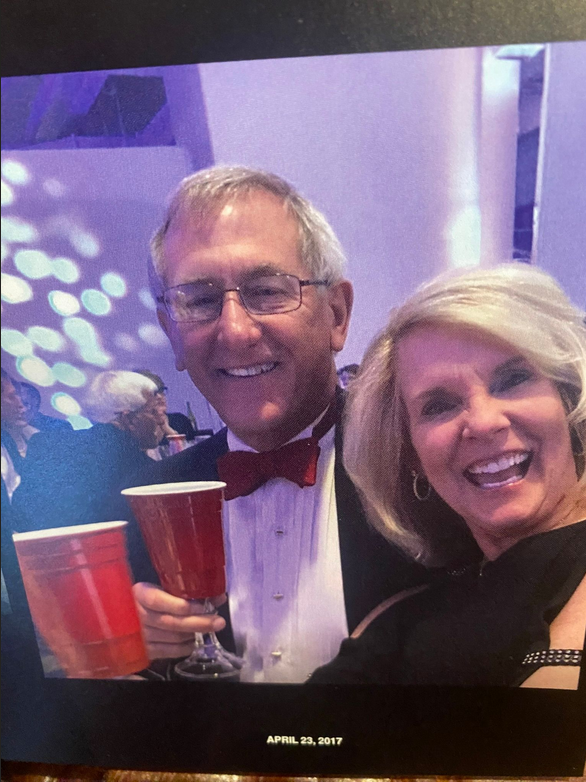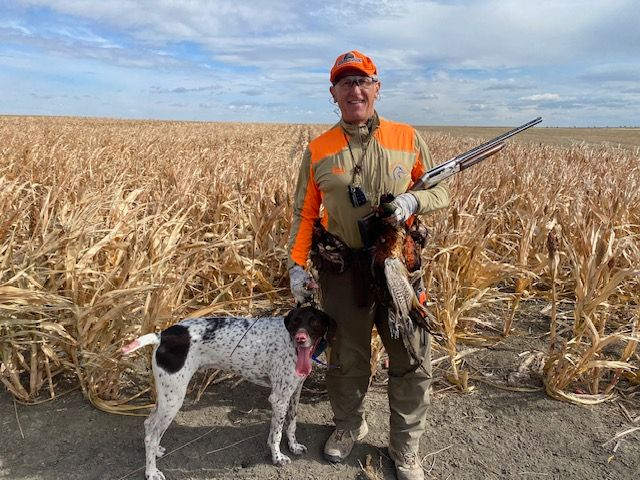Topeka Business Hall of Fame | Gary Yager
Photos by JEFF CARSON & JENNIFER GOETZ
When you picture a man who’s being inducted into the Junior Achievement Topeka Business Hall of Fame, has been part of the banking industry his entire life, worked his way up to executive positions, started his own bank and then sold it for a profit 20 years later, you probably don’t picture him staying in a rural hotel with his dog.
But for those who know Gary Yager, former president and CEO of VisionBank, the thought of him sleeping in one double bed and his faithful German shorthaired pointer, Zeke, sleeping in the other, isn’t strange at all.
THE GAME BEGINS
Gary was born in Kansas City, Missouri, to a family used to having to stretch a dollar to make ends meet. His mother passed away when he was 5 and his younger brother was 1, leaving his father to raise the two small boys on his own.
“From that point on, Dad raised us as a blue-collar worker who put in countless hours to make sure we always had what we needed,” Gary said. “Yet even with all those hours he put in, Dad never missed a practice, a game or a school event.”
Gary attended an inner-city high school in KCMO, where he ran track and played football, baseball and basketball. His athleticism caught the eye of some regional colleges, and he initially signed to play football at William Jewell College in Liberty, Missouri.
Then Washburn University came courting. Gary stepped one foot on campus and knew it was the right fit for him. That was 1972.
While some might find the move from Kansas City to Topeka a bit of a culture shock, for Gary, it didn’t seem much different from the neighborhood where he grew up.
“I think that was part of the reason Topeka felt so familiar to me even from the beginning,” Gary said.
Like countless other incoming college freshmen, Gary declared biology as his major. And, like countless other sophomores, he then changed his major.
“Biology wasn’t my forte,” Gary said. “But it took me two full years to finally figure that out.”
Gary switched his focus to business, but without any of the business prerequisite credits, he found himself almost two years behind. That meant taking 18 credit hours per semester on top of a busy football schedule.
LEAVING IT ALL ON THE FIELD
The challenges in the classroom weren’t the only obstacles thrown in Gary’s way. A fabulous performance on the football field his freshman year earned Gary a spot on the traveling team and a starting position as a running back/tailback his sophomore year. Then a broken ankle ended his sophomore season.
Gary came roaring back as a starter in his junior year. Once more, an injury put him on the sidelines. This time it was a broken rib from a hit during a screen play. In a déjà vu moment during his senior year, Gary suffered a bruised sternum during yet another screen play.
“That is the worst feeling as an athlete, being injured and just wanting to get back out there and play,” Gary said.
Gary didn’t let those injuries sideline him for long. He led the Washburn Ichabods in rushing as both a junior and a senior, with 439 yards and three touchdowns his junior year, and 784 yards and eight touchdowns his senior year. Gary was named first team all-CSIC as a senior and was inducted into the Washburn University Sports Hall of Fame in 2009.
In addition to creating success on the football field, Gary also found success in the classroom, graduating on time in 1976 with a degree in business administration.
A NEW GAMEPLAN
With college in his rearview mirror, Gary needed a new playbook. A friend of his who worked at First National Bank in Topeka suggested he apply for an available position as an account collector.
“That job title sounds worse than it was,” Gary said. He added that it was a great learning experience for becoming a loan officer, a promotion he earned two years later.
Gary soon went from loan officer to manager of a First National Bank branch, then on to assistant vice president. But with that new responsibility came significant travel, which required him to be away from home every other week. With his second baby on the way, Gary and his wife, Widge, decided he needed to make a change for the good of the family.
In 1986, Gary joined Commerce Bank & Trust (now CoreFirst Bank & Trust) as a commercial loan officer. He spent the next decade managing a multimillion-dollar loan portfolio before making forward progress toward his career goal. This time in executive positions with Columbian Bank & Trust, and then as vice chairman at Western National Bank.
As any experienced running back will tell you, those small gains down the field with each play are vital to the outcome of the game. But the occasional well-thrown Hail Mary can be a game changer. Gary’s game changer came in the form of three friends with a vision: starting their own bank.
“I am not sure if it was pure guts or stupidity, or maybe a mixture of the two,” Gary said. “But we decided to go for it.”
CALLING HIS OWN PLAYS
The group of investors raised the required $6 million in six months and opened the doors of VisionBank on May 2, 2005. Bringing in two large insurance company accounts allowed the bank to incorporate the best software in the industry to streamline commercial deposit capabilities, including check collection, fraud prevention, verified authentication, wire transfer and ACH capability.
“We were really the first bank in Topeka that offered these sophisticated features, so that really set us apart from everyone else,” Gary said.
With some key corporate accounts and a growing loan portfolio, the future of the bank looked bright for the next two years. Then in 2007 and 2008, they were blindsided with a financial hit. The economy tanked, peopled defaulted on loans and banks accumulated toxic assets, resulting in a perfect storm that turned the banking industry on its head. For those banks that survived the initial crash, it was a difficult five-year struggle back to financial health.
“We were fortunate at VisionBank because we only lost money in one quarter during that entire meltdown,” Gary said. “I believe our conservative approach made all the difference.”
Having maintained financial stability throughout the financial crisis, VisionBank came out of the huddle once again focused on growth. They became a Six Sigma bank, incorporating the methodology to streamline every process within the bank. They hired more loan officers and other key personnel and created a team based on a culture of empowerment.
“We never felt the need to micromanage anyone at the bank,” Gary said. “We brought many of our employees in right out of college and gave them on-the-job training, so they knew how we wanted things done.”
Unlike some business owners who find it difficult to part with a business they started from scratch, Gary didn’t struggle with the decision to sell VisionBank to Community National Bank out of Seneca, Kansas.
“We started the bank with the purpose of selling it. It was always meant to be an investment, not a legacy deal,” Gary said.
They closed on the sale in December 2021.
HOME TEAM SUPPORT
Washburn University has had a huge impact on Gary and VisionBank, and vice versa. The most evident example is Ichabod football’s Yager Stadium.
In addition to having his name on the stadium, Gary has also supported Washburn University by offering internships to Washburn’s business students, funding numerous scholarships and university initiatives, and by serving on the committee that hired Ichabods’ head football coach Craig Schurig.
VisionBank also started the tailgating tradition in 2001 that has grown from five tents to a 30-person waitlist.
Washburn University holds a special place in Gary’s heart — not only because of his storied football career, but also because it’s where he met the love of his life.“Widge and I actually met on the football field,” Gary said. “She was playing in a sorority Powder Puff football game, and I was their coach.”
Gary and Widge hit it off right away, primarily because they both understood the work ethic and discipline required of elite level athletes. Widge was a competitive gymnast at Washburn and held the conference title.
The couple never seriously considered leaving Topeka. As a local, Widge already had family roots firmly planted in the capital city. And even though he was a transplant, Gary’s roots had now taken hold, entwined with hers.
They have been married for 47 years and share two sons and two grandchildren.
“I wouldn’t be where I am today without my wife,” Gary said. “As an inner-city kid who didn’t attend the best schools, I didn’t have the best communication skills. Widge polished some of my rough edges, taught me how to communicate more effectively and use proper etiquette.”
She also introduced him to some influential people and encouraged him to become more involved in the community. Throughout his career, Gary has sat on more than 40 boards, been an active member of the 20/30 Club of Topeka, served in a variety of positions in the Banking Association and has supported many local organizations, including the Topeka Zoo. He even won the naming rights for a baby hippo born at the zoo in 2010.
POSTGAME PLANS
Now that Gary is retired, he plans to play some golf and travel more with family and friends. He and Widge are headed to the British Virgin Islands in the spring to spend time on a catamaran with some of their lifelong friends. After that, they’re off to do some sightseeing in Iceland and Scotland. They will head to Napa Valley over the summer to meet up with a few former college buddies and spend time at a lake house they own in Council Grove, which has been in Widge’s family for decades.
But you won’t find Gary traveling with Widge after October. Once hunting season starts, Gary will travel all over the country with his best bird-hunting buddy, his dog, Zeke. Of course, everywhere they stay he must have two beds: one for him and one for Zeke.










